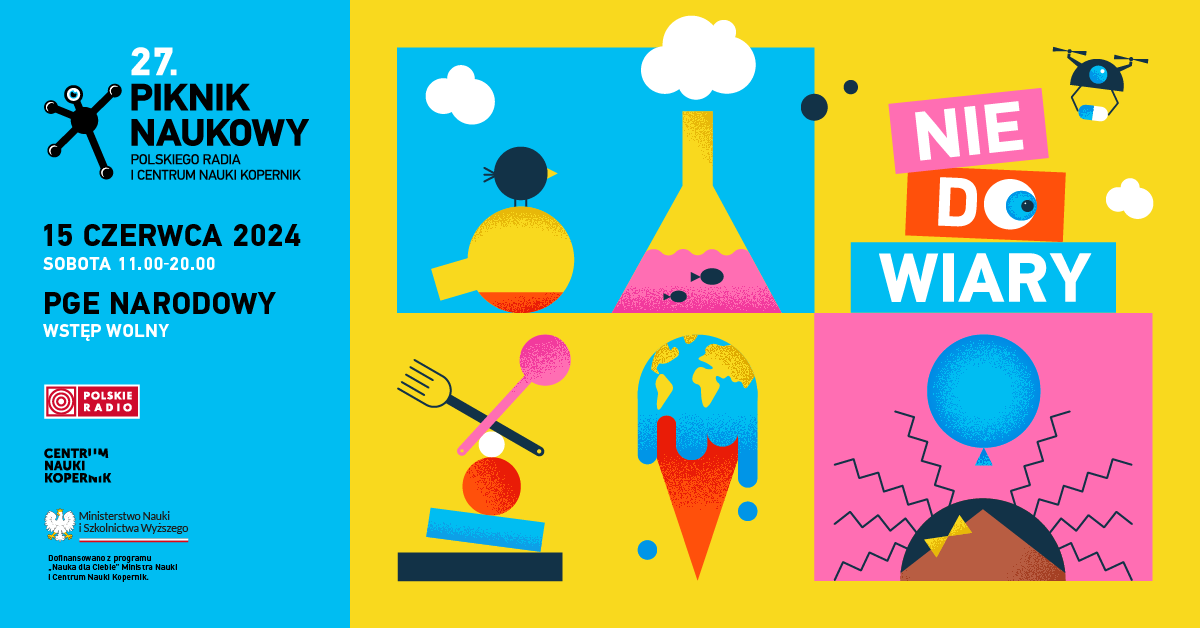Join IBB PAS at the Science Picnic
We invite everyone to join the Science Picnic. The lead theme for 2024 is: Unbelievable!
June 15, 2024
Saturday, 11 am – 8 pm
PGE NARODOWY
FREE ENTRY
IBB PAS stand: Strefa Zdrowia – G1
Stand of the Arctowski Polish Antarctic Station: Strefa Rodzinna – F4
Main theme of the demonstrations prepared by IBB PAS:
The fascinating world of microbiomes
Demonstration: All-powerful microbiomes
Microbes in a specific environment, their interactions with each other and with the environment.
In the natural environment, microorganisms are part of complex ecosystems known as microbiomes. Our world is inhabited by many microorganisms that, living side by side, must both cooperate and compete with each other. Did you know that bacteria are present on and inside your body? It is unbelievable that the number of bacterial cells in a person’s body is close to the number of the person’s own cells.
Visitors will find out what microbiomes are, where we can find them and how we can use them. By viewing exhibits showing microbes and the complex ecosystems they create, listening to presentations or taking part in discussions, they will learn about the world of microorganisms and their interactions with each other and with the environment. They will take part in a game of guessing whereare the most bacteria in our bodies, and they will learn about the number of bacterial cells in the human body.
Demonstration: DNA sequencer
DNA sequencing – a method that makes it possible to learn about the genomes of individual organisms and the metagenomes of complex ecosystems in which microorganisms live, the so-called microbiome. Not long ago, sequencing of the human genome seemed almost unattainable. Today, the Human Genome Project is 99.7% complete, and individualized therapies selected on the basis of a person’s genome may soon become the standard in medicine. Unbelievable! During the workshop we will present the structure of the DNA molecule, the principle of nucleotide complementarity, we will explain the basic concepts of genomics and metagenomics, and we will show what DNA sequencing is really about. And all this using macro-scale models!
During the meeting we will show what a DNA molecule looks like and how we can sequence the genomes of individual organisms and the metagenomes of complex ecosystems in which microorganisms live, so-called microbiomes. The goal of the workshop will be to introduce the principle of nucleotide complementarity in a DNA molecule and to discuss the importance of this principle for DNA sequencing. Workshop participants will have the opportunity to familiarize themselves with the basic concepts of genomics and metagenomics.
The participants will be asked to match nucleotides with fluorophores to a matrix strand, and then to read the nucleotide sequence using a website created for this purpose, which they will open on their phones with a QR code (available on the poster). On the “DNA sequencer” website, participants will indicate the colors of nucleotides with fluorophores (foam puzzles) one by one, and the “sequencer” will decode the sequence and provide information about the decoded DNA.
Main theme of the demonstrations prepared by the Arctowski Polish Antarctic Station:
Exploring the inaccessible and complex world of polar ecosystems
Demonstration: Magical tattoos
A diverse and amazing world presented in tattoos.
What you normally can’t see (chemical molecules, viruses, microorganisms), or slightly larger organisms living in inaccessible polar environments, to take home with you in the form of a tattoo!
Visitors will choose a tattoo design, and then a washable tattoo will be applied to the hand. During this activity, the visitors will be able to learn more about their chosen symbols/designs.
Demonstration: The fascinating polar world
Biodiversity of inaccessible polar ecosystems. There are many interesting things going on in the Antarctica that are hard to believe. The air temperature is not freezing everywhere, bacteria live in the glaciers, penguins make trips through the ocean of several hundred kilometers and dive to depths of more than 100 meters. Tiny krill live there, and mysterious gillworms, and corals and starfish live on the sea floor. Thanks to mosses and lichens, the landscape can be very colorful. We invite you to take a pontoon trip among the icebergs and visit the Polish research station.
Visitors will see exhibits brought from Antarctica, a model of the new Polish Antarctic Station, currently under construction, and several short films, and at the same time they will learn more about this inaccessible environment through conversation with researchers who have had the opportunity to get to know the region personally. In the tent, “young researchers” will be able to enter the pontoon, watch films and take a photo against a wall with a polar landscape, count penguins and learn how to draw them or create them with origami.
Links:
https://www.facebook.com/PiknikNaukowy
https://www.youtube.com/watch?v=ySXFoVeH9j8
https://pikniknaukowy.pl/artykul/3365827
https://pikniknaukowy.pl/artykul/3365630



